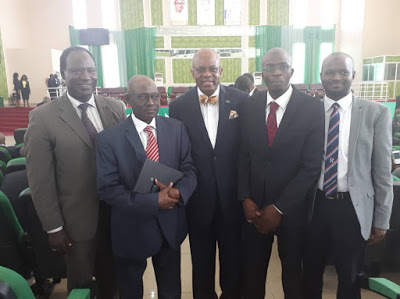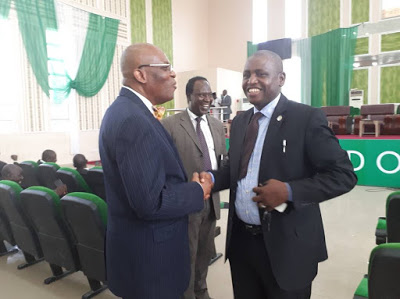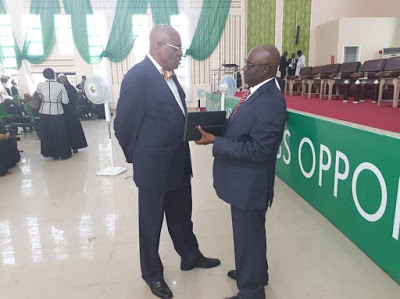
The Learned Silk is in the city of Kano for the NBA Law week, where he delivered a lecture on the topic “Good Governance, Corruption and Economic Development: Nigeria’s Experience and the Journey So Far”.
The law week promises to be exciting with key insights to be delivered from the 5th – 9th of May, 2018.
Excerpts of Paul Usoro’s lecture can be viewed below:
“Traditionally, the Bar Law Week gives us opportunity to examine topical issues as far as Nigeria is concerned, and it is quite interesting that this time, the Kano Bar decided to pick a very interesting topic – Good Governance, Corruption and Economic Development: Nigeria’s Experience and the Journey so Far.
It is also interesting that the theme of this Law Week is actually geared “Towards Improving the Quality of Justice Delivery in Nigeria.
One of the significant ingredients for good governance is quality justice delivery. Without quality justice delivery, it is impossible for us to talk about good governance.
Essentially, good governance relates to political and institutional processes, and outcomes that are deemed necessary to achieve the goals of development.
The true test of good governance is the degree to which it delivers on the promise of human, civil, cultural, economic, political and social rights.

Good Governance, according to the United Nations Commission on Human Rights is the process by which public institutions conduct public affairs, manage public resources and guarantee the realization of human rights in a manner essentially free of abuse and corruption, and with due regard to the rule of law.
This definition indeed, incorporates justice delivery and the rule of law as features of good governance.
There are four (4) pillars that determine good governance according to the International Development Association. These four pillars are:
• Accountability
• Transparency
• Rule of Law
• Participation of the Citizenry
Transparency of decision making, particularly in budget, regulatory and procurement processes, is critical to effectiveness of resource use and the reduction of corruption and waste.
There must be a fair, predictable and stable legal framework which helps businesses and individuals to assess economic opportunities and act on them without fear of arbitrary interference or expropriation.
Good governance requires that civil society has the opportunity to participate during the formulation of development strategies.
Good leadership sets the tone for the standard of good governance. Without having good leadership, it will be difficult for us to have good governance.
When there is transparency in government, the private sector which is acknowledged as the engine room for economic development will have confidence in the economy and will want to invest.
Investment can only go to a place where there is good governance. Good governance is a precondition for economic development, which essentially means that the wellbeing and quality of life of the citizenry is dependent on good governance.
Good governance creates a viable economy with a knock-on result being economic development. The indexes for determining this economic development in a country are:
• Ease of doing business and predictability of economic policies – If you have good governance, the ease of doing business will be enhanced.
• Increased local investments as well as FDIs
• Job creation and opportunities;
• Assured security of lives and properties;
• A satisfied, patriotic and tax compliant citizenry.
Corruption is a bane to economic development. Monetary corruption is very bad, but corruption goes beyond financial corruption, which includes embezzlement, bribery etc. Corruption is common in all countries, irrespective of their stages of development.
The Black’s Law Dictionary, 8th Edition, defines corruption in two aspects:
– Depravity, perversion, or taint; an impairment of integrity, virtue, or moral principle; especially, the impairment of a public official’s duties by bribery.
– The act of doing something with an intent to give some advantage inconsistent with official duty and the rights of others; a fiduciary’s or official’s use of a station or office to procure some benefit either personally or for someone else, contrary to the rights of others.
Other forms of corruption that affect economic development occur when:
– Law-making processes are subverted and there is no transparency.
– Marks and grades are given in exchange for sex or some other forms of inducements or extortions or they are simply awarded on grounds other than merit
– Employment, appointments and contract awards and procurements are made, not on merit but based on some other opaque and corrupt considerations
– Approvals are given based on corrupt considerations
– Independence of the judiciary and independence of judges is tampered with and taken away by overbearing executive interference
– Electoral processes are tempered with
*A corrupt system produces a weak institution.
*As lawyers, we must be able to speak against corruption even when there is executive intimidation, interference and harassment. We must ensure that the bench is not corrupt.

Government must consciously acknowledge that good leadership is critical to good governance, and must ensure that good leadership is entrenched in Nigeria. It must also make relentless efforts to curb corruption.
Our Leaders must lead by example by respecting the basic principles of good governance – accountability, transparency, rule of law, citizenry participation in policies of government, restoration of due process and respect for laid down rules. It is important that the institutions that fight corruption must be strengthened. Fighting corruption in a way that erodes the rule of law is also corruption on its own. It is difficult to fight corruption with corruption. There must be a proper system to fight corruption”
